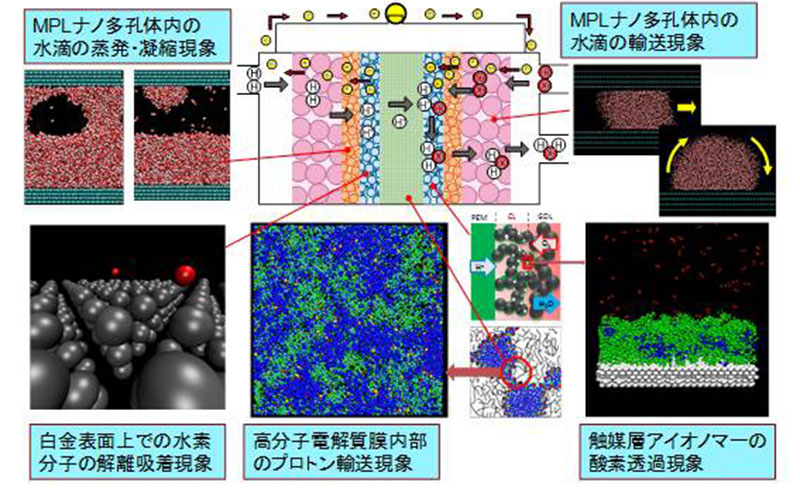Global Collaborative Research and Education Center for Integrated Flow Science (IFS-GCORE)
Novel Battery Nanoscale Flow Concurrent Laboratory

Concurrent ProfessorTakashi Tokumasu
Development of clean energy sources, such as solar cell, Lithium ion battery and fuel cell, is increasingly accelerated all over the world because of recent problems of global-warming and nuclear power plant. It is indispensable to comprehend and control the flow of reactants or products in these batteries to improve the efficiency and decrease the cost. However, it is impossible to comprehend the flow dynamics of these substances accurately by conventional experiments or simulations because the flow field in these batteries consists of aggregations of very fine structure which is of the order of nanometer. Our laboratory analyzes the “flow”, or transport phenomenon of reactants or products in the batteries by large scale quantum calculation or classical molecular dynamics method using a supercomputer. Moreover, we aim to make a theoretical design of a next-generation battery which is high efficiency and low cost by comprehending the characteristics and governing factors of the transport phenomenon from the simulation results.
【Quantum Nanoscale Flow Systems Laboratory】
Construction of proton hopping model to analyze the transport phenomena of proton
Reactive Force-Field Molecular Dynamics Study of deposition mechanism on the atomic layer deposition and chemical vapor deposition methods
Molecular Study for Controlling Intracellular Protein Function Using Artificial Phase-Separated Structures and Selective Transmembrane Ion Channels
【Quantum Nanoscale Flow Systems Laboratory】
Construction of proton hopping model to analyze the transport phenomena of proton
Reactive Force-Field Molecular Dynamics Study of deposition mechanism on the atomic layer deposition and chemical vapor deposition methods
Molecular Study for Controlling Intracellular Protein Function Using Artificial Phase-Separated Structures and Selective Transmembrane Ion Channels
Quantum/molecular dynamics studies of transport phenomena of substances in polymer electrolyte fuel cell
Parts of polymer electrolyte fuel cell, such as micro porous layer, catalyst layer and polymer electrolyte membrane, consist of very fine structures which are of the order of nanometer. Therefore it is impossible to analyze the flow characteristics of substances which transport through them accurately by conventional simulations based on continuum theory. In this study we analyze the transport phenomena of the substances in polymer electrolyte fuel cell by large scale quantum calculations or classical molecular dynamics simulations using a supercomputer and make a theoretical design of next-generation fuel cell systems from the simulation results.
 Large scale molecular simulations of transport phenomena of substances in polymer electrolyte fuel cell
Large scale molecular simulations of transport phenomena of substances in polymer electrolyte fuel cell
Quantum/molecular dynamics studies of transport phenomena of Li ions in all solid state battery
Li-ion batteries are widely used in automobile batteries and smartphones, but they have problems such as flammability and long charging time. All solid state battery in which the liquid electrolyte of a Li-ion battery is replaced with a solid electrolyte is currently attracting attention as a technology that solves the disadvantages of this Li-ion battery. In order to put this all solid state battery into practical use, it is necessary to improve the transport characteristics of Li ions inside the solid electrolyte and the positive and negative electrode active materials. In this research, we analyze the transport phenomena of Li ions inside the solid electrolyte and the active materials of the positive and negative electrodes by molecular simulation and the knowledge is used for the practical use of all solid state batteries.
 Large scale molecular simulations of transport phenomena of Li ion in all solid state battery.
Large scale molecular simulations of transport phenomena of Li ion in all solid state battery.
